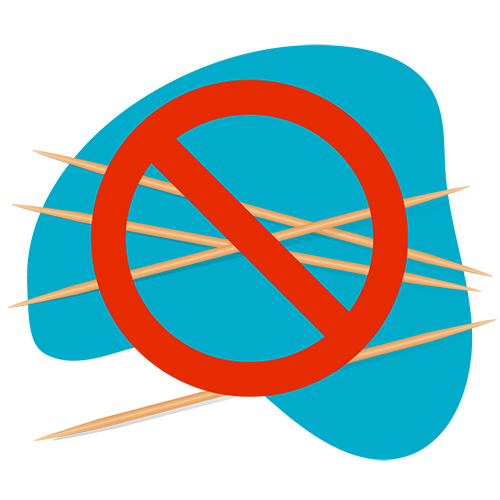Ideally, all of us should be brushing our teeth twice a day. Good oral hygiene and regular visits to the dentist for professional cleanings help us maintain healthy teeth and gums. But, is simply brushing our teeth enough? Unfortunately, when we brush, we are not always getting the bristles in those hard-to-reach areas between the teeth. If they're not cleaned out, cavities or gum disease can begin there.
Let’s take a look at a few different ways we can clean those spaces between our teeth:

Dental floss
When used properly, dental floss can be very effective at cleaning in between the teeth. The floss should be slid between the teeth, then held firmly against the side of the tooth with a gentle up and down movement to remove the plaque build-up on the tooth. It is important to hold the floss against the sides of each tooth as you clean them.
There are several different types of dental floss made in varying thickness as well as floss picks, which are pre-attached to a handle for convenience.
Because of mobility issues, hard to clean bridgework, tight spaces between teeth, or a variety of other reasons, traditional dental floss may not be the right fit for your oral health routine. There are plenty of alternatives that can be just as effective when done correctly.

Toothpicks
Standard toothpicks may work to dislodge food from our teeth, but they are not designed for dental cleaning. Since they are made from wood, toothpicks are usually sharp and brittle. They can easily sliver and lodge under the gums. The shape is not designed to fit between the teeth, so it can cause tissue damage.
Some toothpicks are designed with the proper shape to clean in between the teeth. The wood used is flexible when moistened and they are shaped to fit in between teeth without causing damage. Your dentist may have a sample you can try.

Interdental brush
There are several shapes and sizes of interdental brushes. Depending how your teeth are spaced, you may find these to be very useable. The interdental brush has several bristles attached to a thin bendable wire. The brush is gently inserted in between the teeth to clean the space. A thinner brush may be needed for your front teeth, while a wider brush may be needed for the back teeth.
These interdental brushes are also very good for cleaning underneath fixed bridge work. If you are having difficulty using these, or finding the correct shape for your teeth, your dentist or dental hygienist will be able to help. Usually each of these brushes lasts for about a week of use.

Dental water jets
Dental water jets or water flossers can be very effective for interdental cleaning. Water is pulsated under pressure and ejected through a small tip to clean in between teeth.
There are different designs and models of water jet devices. Choose carefully, studies have shown they are not all equally effective. Some have adjustable pressure settings and different designs or sizes on the tips. If you are unsure, it is recommended to look for the American Dental Association’s Seal of Acceptance.
Even though everyone’s mouth is different, cleaning between your teeth is important to prevent cavities and plaque buildup. Find the tool that works best for you, or ask your dentist or dental hygienist for help.
This information in this post is for general educational purposes only and does not warrant or represent any information as related to health as specifically appropriate for you. It is not intended to be medical advice or replace the relationship that you have with your health care providers. You should always seek medical advice on any diagnosis or treatment from a qualified health care provider. The information is provided “as is” without any representations or warranties, express or implied.






